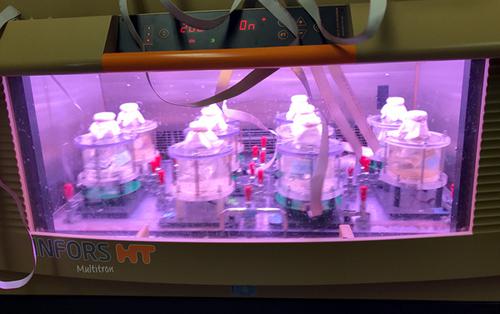当前位置:
X-MOL 学术
›
Biotechnol. Bioeng.
›
论文详情
Our official English website, www.x-mol.net, welcomes your
feedback! (Note: you will need to create a separate account there.)
Impact of Low-intensity Pulsed Ultrasound on the Growth of Schizochytrium sp. for Omega-3 Production.
Biotechnology and Bioengineering ( IF 3.5 ) Pub Date : 2020-09-19 , DOI: 10.1002/bit.27572 Oleksandra Savchenko 1 , Jida Xing 2 , Mark Burrell 3 , Robert Burrell 1 , Jie Chen 1, 2
Biotechnology and Bioengineering ( IF 3.5 ) Pub Date : 2020-09-19 , DOI: 10.1002/bit.27572 Oleksandra Savchenko 1 , Jida Xing 2 , Mark Burrell 3 , Robert Burrell 1 , Jie Chen 1, 2
Affiliation

|
Schizochytrium sp. is a microalga that is known for its high content of oils or lipids. It has a high percentage of polyunsaturated fatty acids in the accumulated oil, especially docosahexaenoic acid (DHA). DHA is an important additive for the human diet. Large‐scale production of Schizochytrium sp. can serve as an alternative source of DHA for humans as well as for fish feed, decreasing the burden on aqua systems. Therefore, research on improving the productivity of Schizochytrium attracts a lot of attention. We studied the potential of using low‐intensity pulsed ultrasound (LIPUS) in the growth cycle of Schizochytrium sp. in shake flasks. Different intensities and treatment durations were tested. A positive effect of LIPUS on biomass accumulation was observed in the Schizochytrium sp. culture. Specifically, LIPUS stimulation at the ultrasound intensity of 400 mW/cm2 with 20 min per treatment 10 times a day with equal intervals of 2.4 h between the treatments was found to enhance the growth of Schizochytrium biomass most effectively (by up to 20%). Due to the nature of cell division in Schizochytrium sp. which occurs via zoospore formation, LIPUS stimulation was inefficient if applied continuously during all 5 days of the growth cycle. Using microscopy, we studied the interval between zoospore formation in the culture and selected the optimal LIPUS application days (Days 0–1 and Days 4–5 of the 5‐day growth cycle). Microscopic images have also shown that LIPUS stimulation enhances zoospore formation in Schizochytrium sp., leading to more active cell division in the culture. This study shows that LIPUS can serve as an additional tool for cost‐efficiency improvement in the large‐scale production of Schizochytrium as a sustainable and environmentally friendly source of omega‐3 (DHA).
中文翻译:

低强度脉冲超声对裂殖壶菌生长的影响。用于 Omega-3 生产。
裂殖壶菌属。是一种微藻,以其高含量的油或脂质而闻名。它在积累的油中含有高比例的多不饱和脂肪酸,尤其是二十二碳六烯酸 (DHA)。DHA是人类饮食的重要添加剂。裂殖壶菌的大规模生产。可作为人类和鱼类饲料的 DHA 替代来源,减轻水产系统的负担。因此,提高裂殖壶菌生产力的研究备受关注。我们研究了在裂殖壶菌属植物生长周期中使用低强度脉冲超声 (LIPUS) 的潜力. 在摇瓶中。测试了不同的强度和治疗持续时间。在裂殖壶菌属中观察到 LIPUS 对生物量积累的积极影响。文化。具体而言,发现以 400 mW/cm 2的超声强度进行 LIPUS 刺激,每次治疗 20 分钟,每天 10 次,治疗之间等间隔 2.4 小时,被发现最有效地促进裂殖壶菌生物量的生长(高达 20%) . 由于 S chizochytrium sp细胞分裂的性质. 这是通过游动孢子形成而发生的,如果在生长周期的所有 5 天中连续应用 LIPUS 刺激是低效的。我们使用显微镜研究了培养物中游动孢子形成之间的间隔,并选择了最佳的 LIPUS 应用天数(5 天生长周期的第 0-1 天和第 4-5 天)。显微图像还表明,LIPUS 刺激可增强裂殖壶菌属中游动孢子的形成,从而导致培养物中更活跃的细胞分裂。这项研究表明,LIPUS 可以作为一种额外的工具,在裂殖壶菌作为一种可持续和环保的 omega-3 (DHA) 来源的大规模生产中作为成本效益提高的工具。
更新日期:2020-09-19
中文翻译:

低强度脉冲超声对裂殖壶菌生长的影响。用于 Omega-3 生产。
裂殖壶菌属。是一种微藻,以其高含量的油或脂质而闻名。它在积累的油中含有高比例的多不饱和脂肪酸,尤其是二十二碳六烯酸 (DHA)。DHA是人类饮食的重要添加剂。裂殖壶菌的大规模生产。可作为人类和鱼类饲料的 DHA 替代来源,减轻水产系统的负担。因此,提高裂殖壶菌生产力的研究备受关注。我们研究了在裂殖壶菌属植物生长周期中使用低强度脉冲超声 (LIPUS) 的潜力. 在摇瓶中。测试了不同的强度和治疗持续时间。在裂殖壶菌属中观察到 LIPUS 对生物量积累的积极影响。文化。具体而言,发现以 400 mW/cm 2的超声强度进行 LIPUS 刺激,每次治疗 20 分钟,每天 10 次,治疗之间等间隔 2.4 小时,被发现最有效地促进裂殖壶菌生物量的生长(高达 20%) . 由于 S chizochytrium sp细胞分裂的性质. 这是通过游动孢子形成而发生的,如果在生长周期的所有 5 天中连续应用 LIPUS 刺激是低效的。我们使用显微镜研究了培养物中游动孢子形成之间的间隔,并选择了最佳的 LIPUS 应用天数(5 天生长周期的第 0-1 天和第 4-5 天)。显微图像还表明,LIPUS 刺激可增强裂殖壶菌属中游动孢子的形成,从而导致培养物中更活跃的细胞分裂。这项研究表明,LIPUS 可以作为一种额外的工具,在裂殖壶菌作为一种可持续和环保的 omega-3 (DHA) 来源的大规模生产中作为成本效益提高的工具。











































 京公网安备 11010802027423号
京公网安备 11010802027423号